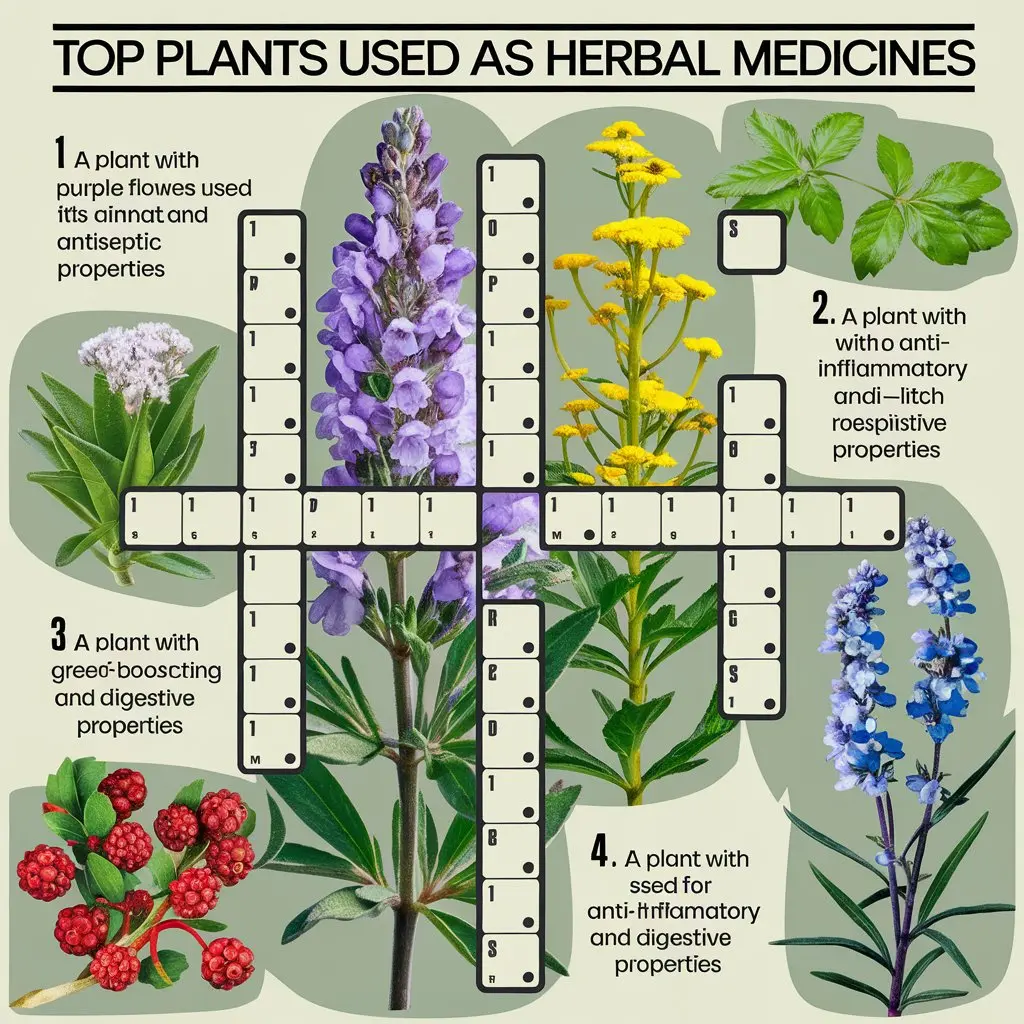Crossword puzzles often feature clues about plants with medicinal properties. These clues may seem tricky, but once you understand the popular plants in herbal medicine, solving them becomes easier. This guide covers some of the most common plants referenced in crosswords for their healing powers. Let’s dive into the top plants used as herbal medicines that you’re likely to see in crossword puzzles.
1. Aloe Vera
Description: Aloe vera is a succulent plant known for its gel-filled leaves.
Medicinal Use: Aloe vera gel is famous for its soothing, healing effects on skin. It treats sunburns, minor cuts, and skin irritations. People also use it in cosmetics and skincare products due to its hydrating properties.
Crossword Clue Tips: Clues might include “succulent for sunburn” or “skin-soothing plant.”
2. Ginseng
Description: Ginseng is a slow-growing plant with fleshy roots, popular in Eastern medicine.
Medicinal Use: Ginseng boosts energy levels, reduces stress, and improves mental clarity. It’s commonly used in teas, supplements, and traditional medicine to enhance vitality.
Crossword Clue Tips: Look for clues like “root for energy” or “traditional herb for focus.”
3. Echinacea
Description: Also known as the purple coneflower, echinacea is a flowering plant native to North America.
Medicinal Use: Echinacea is used to strengthen the immune system, reduce inflammation, and help prevent colds. It’s popular in herbal teas and supplements.
Crossword Clue Tips: Clues might say “cold-fighting flower” or “immune-boosting plant.”
4. Chamomile
Description: Chamomile is a small, daisy-like flower with a mild, calming scent.
Medicinal Use: Known for its soothing properties, chamomile is often used in teas to promote relaxation and sleep. It also aids in digestion and helps ease anxiety.
Crossword Clue Tips: Look for clues like “sleepytime tea flower” or “calming herb for tea.”
5. Lavender
Description: Lavender is a purple flowering plant with a distinct, pleasant fragrance.
Medicinal Use: This plant is popular for reducing anxiety, promoting sleep, and relieving headaches. It’s often used in aromatherapy and essential oils.
Crossword Clue Tips: Clues might say “purple plant for calm” or “aromatherapy flower.”
6. Peppermint
Description: Peppermint is a hybrid mint plant known for its refreshing flavor and scent.
Medicinal Use: This plant aids digestion, eases headaches, and reduces nausea. Peppermint tea and essential oil are widely used for their calming and digestive benefits.
Crossword Clue Tips: Look for clues like “minty digestive aid” or “cooling plant for headaches.”
7. Turmeric
Description: Turmeric is a yellow-orange spice derived from the root of the turmeric plant, commonly used in Indian cuisine.
Medicinal Use: Known for its anti-inflammatory properties, turmeric helps with joint pain, boosts immunity, and supports heart health. The active compound, curcumin, is particularly beneficial.
Crossword Clue Tips: Clues could be “spice for inflammation” or “yellow root with health benefits.”
8. Ginger
Description: Ginger is a flowering plant with a spicy root often used in cooking and medicine.
Medicinal Use: Ginger relieves nausea, aids digestion, and reduces inflammation. It’s often consumed in teas, capsules, and culinary dishes.
Crossword Clue Tips: Clues might include “spicy root for nausea” or “herbal remedy for digestion.”
9. Valerian
Description: Valerian is a flowering plant with small pink or white flowers, commonly found in Europe and Asia.
Medicinal Use: This herb is primarily used to help with sleep disorders and anxiety. Valerian root is often included in sleep aid supplements.
Crossword Clue Tips: Clues may say “root for better sleep” or “natural sleep aid plant.”
10. Rosemary
Description: Rosemary is an aromatic herb with needle-like leaves, popular in cooking and traditional medicine.
Medicinal Use: Known for improving memory and concentration, rosemary also supports digestion and boosts immunity. Its essential oil is used in aromatherapy.
Crossword Clue Tips: Look for “herb for memory” or “aromatic kitchen plant.”
11. Sage
Description: Sage is a gray-green herb with soft, velvety leaves, often used in cooking.
Medicinal Use: Sage is known for its antioxidant properties and is used to support memory, digestion, and oral health. It is commonly brewed into tea.
Crossword Clue Tips: Clues could be “herb for wisdom” or “kitchen herb with health benefits.”
12. Calendula
Description: Also known as pot marigold, calendula is a bright yellow or orange flower.
Medicinal Use: Calendula is valued for its skin-healing properties. It helps with cuts, burns, and inflammation. It’s used in creams and ointments for topical application.
Crossword Clue Tips: Look for clues like “healing marigold” or “flower for skin care.”
13. Dandelion
Description: Dandelion is a common flowering plant with bright yellow flowers.
Medicinal Use: Traditionally, dandelion is used to support liver health, reduce bloating, and promote digestion. Its roots and leaves are often brewed into teas.
Crossword Clue Tips: Clues may include “yellow flower for liver health” or “common weed with medicinal roots.”
14. St. John’s Wort
Description: St. John’s Wort is a flowering plant with yellow petals.
Medicinal Use: This herb is primarily used to treat mild depression and improve mood. It’s commonly taken as a supplement or in tea.
Crossword Clue Tips: Clues might say “herb for mood boost” or “yellow flower for mental health.”
15. Licorice Root
Description: Licorice is a flowering plant, but its root is used in traditional medicine.
Medicinal Use: Licorice root aids in treating digestive issues and supports respiratory health. It’s often added to teas and used in supplements.
Crossword Clue Tips: Look for “sweet root for digestion” or “herb for respiratory relief.”
16. Thyme
Description: Thyme is a small, aromatic herb used in cooking and medicine.
Medicinal Use: Known for its antibacterial properties, thyme is used to relieve coughs, boost immunity, and aid digestion. It’s commonly found in teas and essential oils.
Crossword Clue Tips: Clues might say “antibacterial kitchen herb” or “herb for respiratory health.”
17. Feverfew
Description: Feverfew is a small, daisy-like plant with white petals and yellow centers.
Medicinal Use: Feverfew is primarily used to prevent migraines and relieve inflammation. It’s taken as a supplement or tea.
Crossword Clue Tips: Look for “migraine-relief herb” or “plant for headache relief.”
18. Basil
Description: Basil is a fragrant green herb often used in cooking, especially in Italian cuisine.
Medicinal Use: This herb supports digestion, reduces stress, and has anti-inflammatory properties. Basil tea and extracts are popular in herbal medicine.
Crossword Clue Tips: Clues could be “herb for stress relief” or “fragrant kitchen herb.”
19. Garlic
Description: Garlic is a bulbous plant often used in cooking for its strong flavor.
Medicinal Use: Known for its immune-boosting and cardiovascular benefits, garlic is a natural antibiotic. It’s often eaten raw or in supplements.
Crossword Clue Tips: Clues might include “immune-boosting bulb” or “kitchen herb for heart health.”
20. Ashwagandha
Description: Ashwagandha is an adaptogenic herb popular in Ayurvedic medicine.
Medicinal Use: This herb helps manage stress, improve energy, and boost immunity. It’s usually taken as a powder or capsule.
Crossword Clue Tips: Look for “Ayurvedic herb for stress” or “root for energy boost.”
Conclusion
Herbal plants have been used for centuries for their healing properties. From echinacea to ashwagandha, these plants not only offer health benefits but also frequently show up in crossword puzzles. Understanding the medicinal properties of these plants can make it easier to solve crossword clues and expand your knowledge of natural remedies.
Next time you see a crossword clue about a medicinal plant, remember this list of top herbs and their uses. Whether it’s a flower for colds or a root for energy, these common herbs will help you conquer any herbal medicine crossword puzzle.



